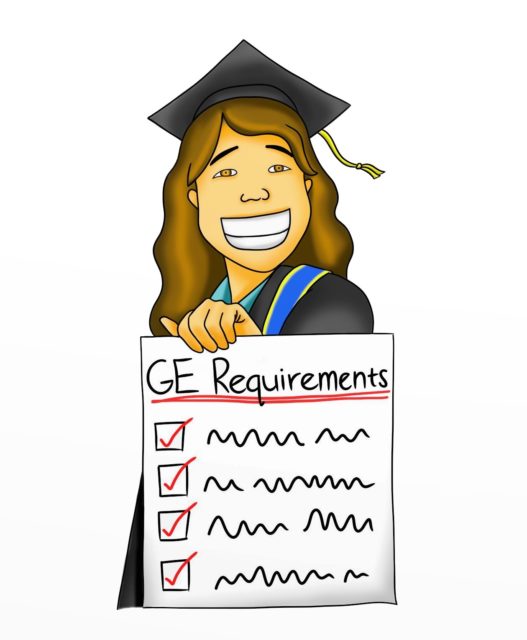In the never-ending struggle to balance college coursework with extracurricular activities, jobs and life in general, there comes a time when certain coursework becomes an undue and frankly unnecessary burden.
And by certain coursework, I mean specific general electives, which are mandatory requirements for UCLA students to graduate.
The theory behind required general electives is a good one – broaden students’ horizons and make them more well-rounded by exploring fields outside of their major. But what faculty and administrators at UCLA fail to recognize is that the skills gained in these courses may already be acquired from prior life experience or individual learning, reducing these required general education courses into a checklist of requirements needed to graduate.
According to a recent study cited in a National Public Radio article, a growing number of universities, including research universities like George Mason University and Colorado State University, have started allowing students to obtain credits to fulfill credit requirements through demonstrations of competency. That means that students don’t have to waste time taking those classes, and can instead simply demonstrate knowledge in that area of study.
This type of action makes particular sense for general education courses when considering the various backgrounds and skills that University of California students must have to even be accepted by the University. It defeats the purpose of taking general electives if students are wasting their time taking courses for an easy A, instead of taking other general education courses to acquire skills and knowledge that they do not already already possess.
For instance, if a student has a background in music despite not being a music-related major, it does not make sense for that student to re-learn the same basic principles about music again. In a case like this, a competency exam for a specific music course would better serve the student and allow him or her to spend that time taking classes that qualitatively improve their education. For example, instead of taking a History of Jazz general elective, students should have the option to take a practical assessment, in addition to a written assessment, such as playing an improvised solo off of a 12-bar blues scale, to demonstrate applied knowledge of fundamental jazz principles.
Additionally, if a student has a summer internship relating to environmental conservation work, the material would likely closely relate to coursework on environmental sciences. Students should be able to submit a portfolio of their work during that internship to the respective department that offers that GE to satisfy a specific course.
To start this competency-based program off, the College of Letters and Science should mandate that departments offer required general electives that essentially contain the same material as high school Advanced Placement and honors courses to create comprehensive competency exams. From my personal experience, some general elective courses, such as Statistics 10 and Life Sciences 2, essentially mirror the coursework included in AP tests and are examples of redundant education in both high school and college.
Additionally, the implementation of such competency examinations would not place too much of a burden on department faculty if it was organized and planned out correctly. Students could register for time slots during a designated competency-exam week on MyUCLA, for example. And if there was a significant demand for such competency exams, then departments could consider allocating more resources toward competency exams.
UCLA already has a successful model in place to base competency exams off of: the foreign language placement exam. The language placement exams consist of a variety of multiple choice and essay questions, depending on the particular language. Because not all students take AP language exams and not all languages are offered in those exams, the foreign language placement exam is critical in giving students who are proficient in other languages the opportunity to satisfy the foreign language requirement.
Concerns about such a program diminishing the UC’s role as a research university are unfounded. General education courses are designed to be basic and introductory and not analytically-based like major courses so that students can learn about other fields outside of their primary coursework.
General education can come from outside of the classroom in an arguably more enjoyable manner. And students should be academically compensated for deeply exploring their interests that coincide with material in general education courses outside of UCLA.

